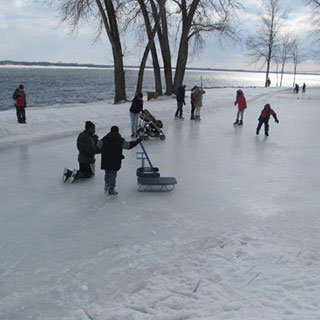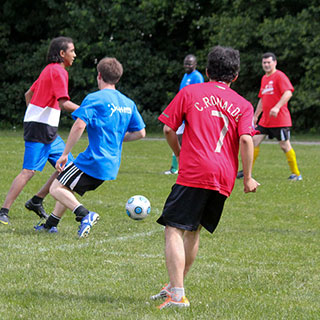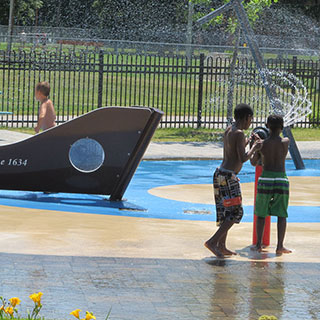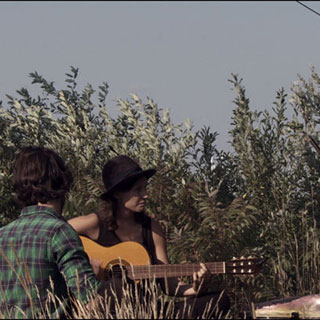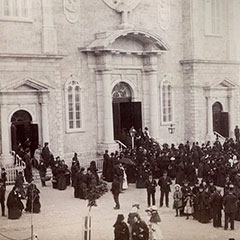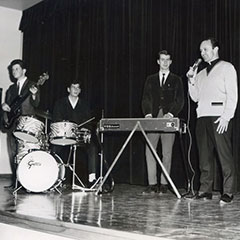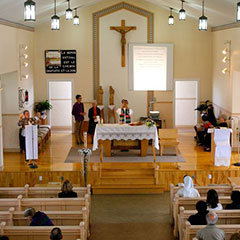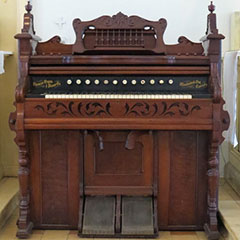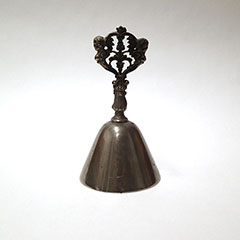Rest, Leisure and Religion
Nowadays, from Friday 5 PM, the radio officially announces the beginning of the weekend! Weekends often represent a resting period for the family members who have just completed their work week. Now that there is no need to rush, Saturday and Sunday pass at a slower pace. The quiet snoring heard while everyone is asleep soon makes way for a breakfast shared happily by the whole family.
Saturday is punctuated with sounds of errands being run and pots clanging as meals are prepared for the coming week. It frequently ends with laughter and the clink of wine glasses heard during dinner with family or friends.
As for Sunday, a much slower tempo is adopted where rest and contemplation are in order. Although these pastimes are valued during the entire weekend, Sunday is much more appropriate for outdoor sports activities that vary according to the season. Parents and children try to forget that the frantic pace of the week will shortly resume...
Before the 1960s in Québec, Sundays were characterized by very strict rituals. Sunday Mass was mandatory. Families first attended Low Mass, starting at 7:30, on an empty stomach to receive communion. After breakfast, they returned to the 10 or 11 o’clock High Mass. There was no communion during this service, just a big celebration with music and Gregorian singing. The rest of the day unfolded with an elaborate lunch, followed by visits from friends and family.
The Evolution of Religious Sundays
After the Vatican II Council redefined religious practices, customs relating to Sundays evolved socially as well. Attendance at Mass went down as a majority of believers lost their motivation. A mandatory Sunday Mass did not make sense to them anymore. Then the service was celebrated in French instead of Latin. Priests attempt to rejuvenate the cult, among other ways, by allowing young people to organize some aspects of the service with modern music, guitars or bands. They are encouraged to make the rituals their own and to mould them to their liking.
With the Quiet Revolution of the 1960s, Québec started the secularization of its institutions, which had a major impact on the future of its churches. According to Statistics Canada in 2000, although more than 80% of the Canadian population considered themselves Catholic, only a few visited churches. In Québec, more than half of Roman Catholics say they attend religious services at least once a year, especially for major religious holidays, such as Christmas or for weddings. Therefore, churches are gradually growing emptier, and Quebecers attended fewer and fewer Sunday church services. Across the province, many churches have been destroyed or converted. The local clergy no longer has the funds needed to maintain and keep these buildings that used to characterize the Québec landscape.
However, some parishes ensure their survival, for example, in neighbourhoods where the immigration of practicing Catholics is important. In some cities, you can thus participate in masses in different languages, ensuring the continuity of Catholic worship, despite the desertion of churches by many Quebecers.
Today, the religious landscape makes room for immigrants and their religious practices. In cities with high immigration rates, immigrant communities are formed, and they develop their place of worship. The bells of the Catholic Church are giving way to the Muslim call to prayer or the Buddhist meditation chants.
Creed 3, Gregorian Song
Download audio (52 seconds, 0.81 MB )
Sung during the Mass.
Source: Musée des Ursulines of Trois-Rivières
I believe in one Lord, Jesus Christ,
the Only Begotten Son of God, born of the Father before all ages.
Gloria Laus, Gregorian Song
Download audio (30 seconds, 0.48 MB )
The Gloria Laus is the procession hymn on Palm Sunday when nuns had their palm fronds in their hands.
Source: Musée des Ursulines of Trois-Rivières
To you, Redeemer King!
To whom the lips of children
Made sweet hosannas ring.
Regina Caeli, Gregorian Song
Download audio (36 seconds, 0.56 MB )
Marian Hymn of the Catholic Church, sung during the Easter season, from Easter Sunday through Pentecost Sunday, instead of the Angelus. The Angelus is sung the rest of the year. The Regina Caeli was sung twice a day: in the morning before Lauds and in the evening after Vespers. The exact time was at 6 am and 6 pm respectively, but today it depends on when Lauds and Vespers are celebrated.
Source: Musée des Ursulines of Trois-Rivières
The Son whom you merited to bear, alleluia
Has risen, as He said, alleluia
Pray for us to God, alleluia.
Jésus. Le Père Tremblay et les Nouveaux Alléluias , 1967
Download audio (2 minutes 32 seconds, 5.80 MB )
A man sings a rock ’n’ roll song about Jesus.
Source: Sébastien Desrosiers. Mondo P.Q.
Bending the reeds
In the streams
Jesus, Jesus, sing in your fingers
The child's laugh
The beggar's bread
The Heart of Death
Jesus, Jesus, sing in your fingers
Jesus, the fingers of the sky
Jesus, the arms of the sky
Jesus, the voice of the sky
Jesus, the king of the sky
Jesus (four times)
If you let me love
For all eternity
The one you gave me
Then I promise you
I will hang my life
To the nails that bruised you
Jesus (four times)
J, as Joyful day of love
E, as Eternal love
S, as Sun of love
U, as Universe of love
S, as Single, as the only one
Jesus (four times)
J.E.S.U.S.
Jesus
The fear of war
The moans of Hell
The chants of our misery
Jesus, Jesus, cry in your fingers
The salt of the earth
The fruits of the sea
Love and light
Jesus, Jesus, sing in your fingers
Jesus (seven times)

